Endings: George RR Martin, Frozen, and Me
 Well, I did finish Storm of Swords as expected last week, and as I did so, I noticed something about George RR Martin’s endings.
Well, I did finish Storm of Swords as expected last week, and as I did so, I noticed something about George RR Martin’s endings.
He’s juggling a lot of different characters, each with their own story arcs, so it’s somewhat unrealistic to expect these arcs to be resolved in each book. Instead, his endings tend to position characters for their next adventure. They point you in the “right direction” to follow the story somewhere new, and then the camera pans away.
The most common negative feedback I’ve received on Rumpled is that the ending feels too abrupt. I want to tell these people that it’s three times longer than the original ending. Really! Still, it’s come up enough for me to give it some serious thought, especially since endings are the hardest part for me and I know how important they are. Many years ago, I read (and took deeply to heart!) some writing advice that encouraged writers to “get out of the way” as soon as possible once the story was resolved. It said that many amateur writers drag the story on for too long after it’s resolved; and I’ve never had the need to see my own characters bask in their victories. Instead, my style has been more like Martin’s, even though I don’t write epic sagas. I prefer to end on a note of ambiguity that points the reader in the right direction, that allows her a pretty good idea of how the story resolves without spelling it out explicitly. I don’t like endings where every loose end is tied up perfectly, but I want my readers to generally feel that they’re leaving the characters in a good place. To this end, I usually “feel it” when the ending has come, and know when it’s time to stop writing, even though I don’t consciously plan out the exact last moment in my mind. In fact, usually my mind goes further into the future than the actual story does, and the moment that feels “right” for ending falls just a scene or two short of that. I tend to let my characters go just as a new story is about to begin, even if I have no intention of writing that next story.
I saw Frozen for the third time over the weekend. And I noticed that it included two scenes after the story’s conflict is resolved: one where Kristoff gets his sled, and one where we get a glimpse of Anna and Elsa reclaiming a semblance of the closeness they once enjoyed. These scenes didn’t advance the plot, but it was so nice just to see the characters enjoying their post-drama/post-trauma lives. It’s what we spend the whole movie waiting for.

And that’s when I really got it about those who expressed disappointment in my endings. They wanted to bask in the victory, just a bit. They wanted to enjoy the resolution they spent so much time waiting for, not just know in their hearts that it occurred. Before this, I always felt that spelling out exactly what happens was a bit of an insult to the reader’s imagination; or that it took the power out of their hands too much, so that there was nothing left to ponder.
I still have a little trouble imagining my own stories adopting an ending style that shows a few scenes just to reassure the reader that things turned out okay. But now I understand how satisfying it can be. Perhaps someday I will try it after all.